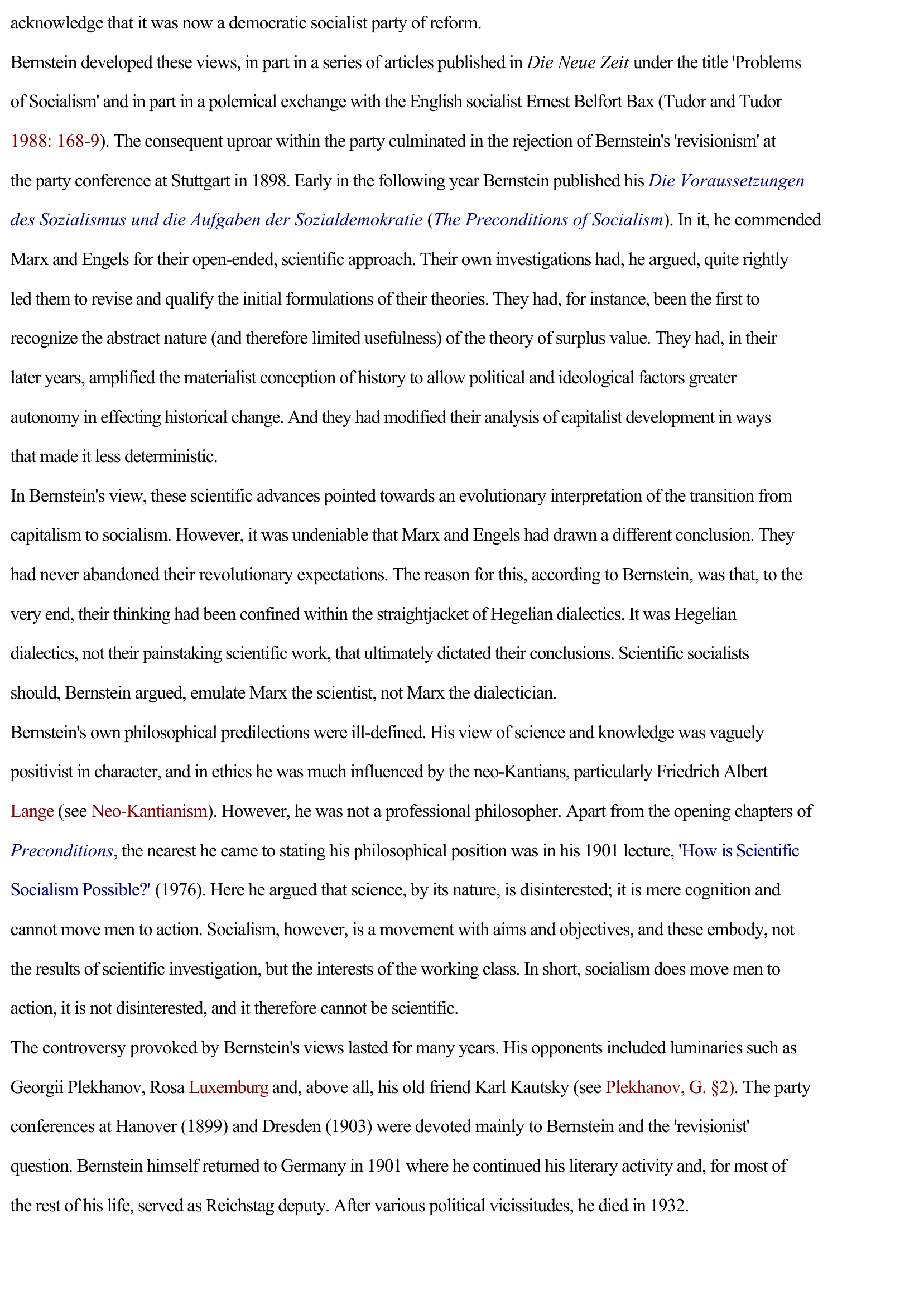Bernstein, Eduard
Publié le 22/02/2012

Extrait du document
«
acknowledge that it was now a democratic socialist party of reform.
Bernstein developed these views, in part in a series of articles published in Die Neue Zeit under the title 'Problems
of Socialism' and in part in a polemical exchange with the English socialist Ernest Belfort Bax (Tudor and Tudor
1988: 168-9 ).
The consequent uproar within the party culminated in the rejection of Bernstein's 'revisionism' at
the party conference at Stuttgart in 1898.
Early in the following year Bernstein published his Die Voraussetzungen
des Sozialismus und die Aufgaben der Sozialdemokratie (The Preconditions of Socialism ).
In it, he commended
Marx and Engels for their open-ended, scientific approach.
Their own investigations had, he argued, quite rightly
led them to revise and qualify the initial formulations of their theories.
They had, for instance, been the first to
recognize the abstract nature (and therefore limited usefulness) of the theory of surplus value.
They had, in their
later years, amplified the materialist conception of history to allow political and ideological factors greater
autonomy in effecting historical change.
And they had modified their analysis of capitalist development in ways
that made it less deterministic.
In Bernstein's view, these scientific advances pointed towards an evolutionary interpretation of the transition from
capitalism to socialism.
However, it was undeniable that Marx and Engels had drawn a different conclusion.
They
had never abandoned their revolutionary expectations.
The reason for this, according to Bernstein, was that, to the
very end, their thinking had been confined within the straightjacket of Hegelian dialectics.
It was Hegelian
dialectics, not their painstaking scientific work, that ultimately dictated their conclusions.
Scientific socialists
should, Bernstein argued, emulate Marx the scientist, not Marx the dialectician.
Bernstein's own philosophical predilections were ill-defined.
His view of science and knowledge was vaguely
positivist in character, and in ethics he was much influenced by the neo-Kantians, particularly Friedrich Albert
Lange (see Neo-Kantianism ).
However, he was not a professional philosopher.
Apart from the opening chapters of
Preconditions , the nearest he came to stating his philosophical position was in his 1901 lecture, 'How is Scientific
Socialism Possible? ' (1976).
Here he argued that science, by its nature, is disinterested; it is mere cognition and
cannot move men to action.
Socialism, however, is a movement with aims and objectives, and these embody, not
the results of scientific investigation, but the interests of the working class.
In short, socialism does move men to
action, it is not disinterested, and it therefore cannot be scientific.
The controversy provoked by Bernstein's views lasted for many years.
His opponents included luminaries such as
Georgii Plekhanov, Rosa Luxemburg and, above all, his old friend Karl Kautsky (see Plekhanov, G.
§2) .
The party
conferences at Hanover (1899) and Dresden (1903) were devoted mainly to Bernstein and the 'revisionist'
question.
Bernstein himself returned to Germany in 1901 where he continued his literary activity and, for most of
the rest of his life, served as Reichstag deputy.
After various political vicissitudes, he died in 1932..
»
↓↓↓ APERÇU DU DOCUMENT ↓↓↓
Liens utiles
- Bernstein, Eduard (politique & socièté).
- Bernstein, Eduard
- BERNSTEIN Henry Léon Gustave Charles : sa vie et son oeuvre
- BEAU DANS LA MUSIQUE (DU), Essai de réforme de l'esthétique musicale, Eduard Hanslick
- Fiche de lecture : SECRET (Le) d'Henry Bernstein

































